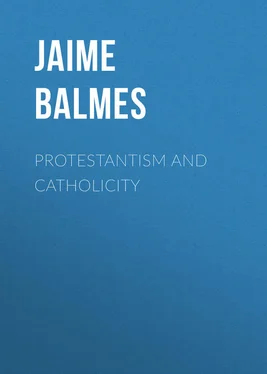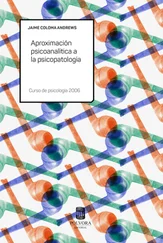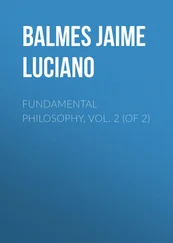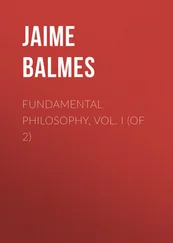Jaime Balmes - Protestantism and Catholicity
Здесь есть возможность читать онлайн «Jaime Balmes - Protestantism and Catholicity» — ознакомительный отрывок электронной книги совершенно бесплатно, а после прочтения отрывка купить полную версию. В некоторых случаях можно слушать аудио, скачать через торрент в формате fb2 и присутствует краткое содержание. Жанр: foreign_antique, foreign_prose, на английском языке. Описание произведения, (предисловие) а так же отзывы посетителей доступны на портале библиотеки ЛибКат.
- Название:Protestantism and Catholicity
- Автор:
- Жанр:
- Год:неизвестен
- ISBN:нет данных
- Рейтинг книги:3 / 5. Голосов: 1
-
Избранное:Добавить в избранное
- Отзывы:
-
Ваша оценка:
- 60
- 1
- 2
- 3
- 4
- 5
Protestantism and Catholicity: краткое содержание, описание и аннотация
Предлагаем к чтению аннотацию, описание, краткое содержание или предисловие (зависит от того, что написал сам автор книги «Protestantism and Catholicity»). Если вы не нашли необходимую информацию о книге — напишите в комментариях, мы постараемся отыскать её.
Protestantism and Catholicity — читать онлайн ознакомительный отрывок
Ниже представлен текст книги, разбитый по страницам. Система сохранения места последней прочитанной страницы, позволяет с удобством читать онлайн бесплатно книгу «Protestantism and Catholicity», без необходимости каждый раз заново искать на чём Вы остановились. Поставьте закладку, и сможете в любой момент перейти на страницу, на которой закончили чтение.
Интервал:
Закладка:
Since, then, religion is a real necessity, we have therein an explanation of the phenomenon which history and experience present to us, namely, that religion never wholly disappears, and that when changes take place, the two rival religions, during their struggles, more or less protracted, occupy successively the same ground. The consequence is, that Protestantism cannot entirely disappear unless another religion takes its place. Now, as in the actual state of civilization, no religion can replace it but the Catholic, it is evident that Protestant sects will continue to occupy, with more or less variation, the countries which they have gained.
Indeed, how is it possible, in the present state of civilization among Protestant nations, that the follies of the Koran, or the absurdities of idolatry, should have any chance of success among them? The spirit of Christianity circulates in the veins of modern society; its seal is set upon all legislation; its light is shed upon all branches of knowledge; its phraseology is found in all languages; its precepts regulate morals; habits and manners have assumed its form; the fine arts breathe its perfume, and all the monuments of genius are full of its inspirations. Christianity, in a word, pervades all parts of that great, varied, and fertile civilization, which is the glory of modern society. How then, is it possible for a religion entirely to disappear which possesses, with the most venerable antiquity, so many claims to gratitude, so many endearing ties, and so many glorious recollections? How could it give place, among Christian nations, to one of those religions which, at the first glance, show the finger of man, and indicate, as their distinctive mark, degradation and debasement? Although the essential principle of Protestantism saps the foundations of the Christian religion, although it disfigures its beauty, and lowers its sublimity, yet the remains which it preserves of Christianity, its idea of God, and its maxims of morality, raise it far above all the systems of philosophy, and all the other religions of the world.
If, then, Protestantism has preserved some shadow of the Christian religion, it was because, looking at the condition of the nations who took part in the schism, it was impossible for the Christian name wholly to disappear; and not on account of any principle of life contained in the bosom of the pretended Reformation. On the other hand, consider the efforts of politicians, the natural attachment of ministers to their own interests, the illusions of pride which flatter men with the freedom they will enjoy in the absence of all authority, the remains of old prejudices, the power of education, and such like causes, and you will find a complete solution of the question. Then you will no longer be surprised that Protestantism continues to retain possession of many of those countries where it unfortunately became deeply rooted.
CHAPTER XI.
THE POSITIVE DOCTRINES OF PROTESTANTISM REPUGNANT TO THE INSTINCT OF CIVILIZATION
The best proof of the extreme weakness of Protestantism, considered as a body of doctrine, is the little influence which its positive doctrines have exercised in European civilization. I call its positive doctrines those which it attempts to establish as its own; and I distinguish them thus from its other doctrines, which I call negative, because they are nothing but the negation of authority. The latter found favor on account of their conformity with the inconstancy and changeableness of the human mind; but the others, which have not the same means of success, have all disappeared with their authors, and are now plunged in oblivion. The only part of Christianity which has been preserved among Protestants, is that which was necessary to prevent European civilization from losing among them its nature and character; and this is the reason why the doctrines which had too direct a tendency to alter the nature of this civilization have been repudiated, we should rather say, despised by it.
There is a circumstance here well worthy of attention, and which has not perhaps been noticed, viz. the fate of the doctrine held by the first reformers with respect to free-will. It is well known that one of the first and most important errors of Luther and Calvin consisted in denying free-will. We find this fatal doctrine professed in the works which they have left us. Does it not seem that this doctrine ought to have preserved its credit among the Protestants, and that they ought to have fiercely maintained it, since such is commonly the case with errors which serve as a nucleus in the formation of a sect? It seems, also, that Protestantism being widely spread, and deeply rooted in several countries of Europe, this fatalist doctrine ought to have exercised a strong influence on the legislation of Protestant nations. Wonderful as it is, such has not been the case; European moralists have despised it; legislation has not adopted it as a basis; civilization has not allowed itself to be directed by a principle which sapped all the foundations of morality, and which, if once applied to morals and laws, would have substituted for European civilization and dignity the barbarism and debasement of Mahometanism.
There is no doubt that this fatal doctrine has perverted some individuals; it has been adopted by sects more or less numerous; and it cannot be denied that it has affected the morality of some nations. But it is also certain, that, in the generality of the great human family, governments, tribunals, administration, legislation, science, and morals, have not listened to this horrible doctrine of Luther, – a doctrine which strips man of his free will, which makes God the author of sin, which charges the Creator with the responsibility of all the crimes of His creatures, and represents Him as a tyrant, by affirming that His precepts are impossible; a doctrine which monstrously confounds the ideas of good and evil, and removes all stimulus to good deeds, by teaching that faith is sufficient for salvation, and that all the good works of the just are only sins.
Public opinion, good sense, and morality here side with Catholicity. Those even who in theory embrace these fatal religious doctrines, usually reject them in practice; this is because Catholic instruction on these important points has made so deep an impression on them; because so strong an instinct of civilization has been communicated to European society by the Catholic religion. Thus the Church, by repudiating the destructive errors taught by Protestantism, preserved society from being debased by these fatalist doctrines. The Church formed a barrier against the despotism which is enthroned wherever the sense of dignity is lost; she was a fence against the demoralization which always spreads whenever men think themselves bound by blind necessity, as by an iron chain; she also freed the human mind from the state of abjection into which it falls whenever it thinks itself deprived of the government of its own conduct, and of the power of influencing the course of events. In condemning those errors of Luther, which were the bond of Protestantism at its birth, the Pope raised the alarm against an irruption of barbarism into the order of ideas; he saved morality, laws, public order, and society; the Vatican, by securing the noble sentiment of liberty in the sanctuary of conscience, preserved the dignity of man; by struggling against Protestant ideas, by defending the sacred deposit confided to it by its Divine Master, the Roman See became the tutelary divinity of future civilization.
Reflect on these great truths, understand them thoroughly, you who speak of religious disputes with cold indifference, with apparent mockery and pity, as if they were only scholastic puerilities. Nations do not live on bread alone ; they live also on ideas, on maxims, which, converted into spiritual aliment, give them greatness, strength, and energy, or, on the contrary, weaken them, reduce them, and condemn them to stupidity. Look over the face of the globe, examine the periods of human history, compare times with times, and nations with nations, and you will see that the Church, by giving so much importance to the preservation of these transcendent truths, by accepting no compromise on this point, has understood and realized better than any other teacher, the elevated and salutary maxim, that truth ought to reign in the world; that on the order of ideas depends the order of events, and that when these great problems are called in question, the destinies of humanity are involved.
Читать дальшеИнтервал:
Закладка:
Похожие книги на «Protestantism and Catholicity»
Представляем Вашему вниманию похожие книги на «Protestantism and Catholicity» списком для выбора. Мы отобрали схожую по названию и смыслу литературу в надежде предоставить читателям больше вариантов отыскать новые, интересные, ещё непрочитанные произведения.
Обсуждение, отзывы о книге «Protestantism and Catholicity» и просто собственные мнения читателей. Оставьте ваши комментарии, напишите, что Вы думаете о произведении, его смысле или главных героях. Укажите что конкретно понравилось, а что нет, и почему Вы так считаете.












